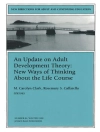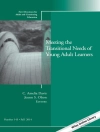In this book Rolf Arnold combines three trends of long years of research activity: innovative teaching methods based on the principles of self-determination and self-control of the learner, the concept of ‘pedagogic leadership’ and finally the approach of ‘emotional competence’. These three pillars form the fundamental basis for ‘Assisted Learning’ as a future-oriented concept of adult education that places the learner at the centre point.
‘Assisted Learning’ (enabling didactics) characterizes a teaching-learning process, which shifts the angle of vision away from teaching to learning. In class, as in other learning situations there is no direct and causal production of learning. Learning takes place exclusively through independent acquisition of the learner. As a result what is taught is not what is learnt.
Daftar Isi
Contents
List of Figures
List of Tables
About the Author
1 Preface
2 The Effects of Education Are Uncertain, but Some Shaping
Is Certainly Possible
2.1 The Dual Uncertainty of Education Effect
2.2 Education As a Moral Communication
3 Learning and Learning Theories
3.1 Learning Concepts
3.2 Overview of Learning Theories
3.3 New Learning Requirements and Learning Methods
4 Learning Guidance and Leadership in Assisted Learning
4.1 Guidance and Counseling
4.2 Leadership
5 Assisted Learning
5.1 From Teaching Culture to Learning Culture
5.2 At the Core: Method
5.3 Rethinking Learning and Education
5.4 E-Learning
5.5 Guided Self-study
5.6 Assisted Learning As a New Approach
6 The Basis: Pedagogic Leadership As Subsidiary Leadership
6.1 Leadership: Empowerment to Self-Leadership
6.2 Self-reflection, Role Distance and Functional Change
of Managers
6.3 Trust: The Emotional Glue of Social Interaction
6.4 Nurturing Stance: Looking for Potential in the Work Force
7 The Systemics of Emotions
7.1 We Are “Lensing” – All the Time!
7.2 Certainty Is What One Feels!
7.3 The Primacy of Emotion
8 Emotional competence as core competence of school leadership
8.1 The “Yes, but.” Syndrome
8.2 Leadership As the Management of Primary Constructions
– Our Own and Those of Others
8.3 Leadership and Followership in Daily School Life
– From a Theory of Emotion Perspective
Bibliography
Tentang Penulis
Prof. Dr. Rolf Arnold, born in 1952, obtained his Ph D at the University of Heidelberg, worked thereafter in an International Adult Education Centre, obtained his postdoctoral qualification at the Distance University of Hagen, Germany in 1987 and has been working since 1990 at the Department of Pedagogics (in the fields of Vocational and Adult Education) at the Technical University of Kaiserslautern. He is also Scientific Director and Chairman of the Board for the Distance and International Studies Centre (DISC) as well as the Speaker of the Virtual Campus Rhineland-Palatinate (VCRP).












